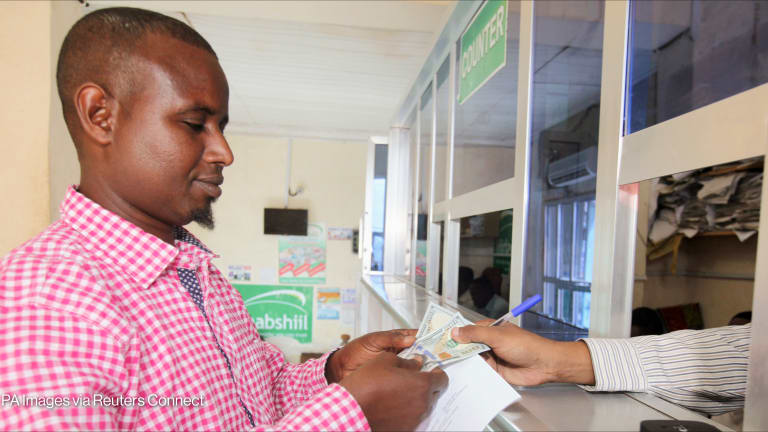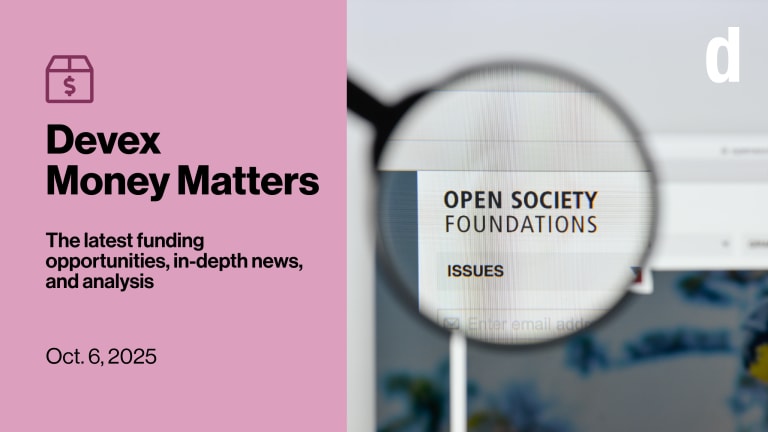Philanthropist Tsitsi Masiyiwa wants African women to start giving big

Underrepresentation of women in philanthropy, both as grantmakers and grant recipients, is a global phenomenon. However, on the African continent, Zimbabwean megadonor Tsitsi Masiyiwa said she wants to create more pathways for women funders who have historically been “extremely limited” by traditional gender roles.
“We have women funders, but there are very few,” she told Devex.
“A lot of women who are high net worth individuals themselves or as families, you find that still the male predominantly makes the final decision on how financial resources are allocated and how the investments are made,” according Masiyiwa, who is board chair of the African Philanthropy Forum and co-founder of the Higherlife Foundation with her husband Strive, a London-based Zimbabwean billionaire businessman and prominent philanthropist in his own right.
Tsitsi Masiyiwa has been a champion for education and healthcare initiatives in Africa. She was recently named “philanthropist of the year” at the annual All Africa Business Leaders Awards, and is trying to create new avenues for African women philanthropists to support organizations focused on gender equality.
She is the lead organizer of the African Gender Initiative, a network launched in October to unite African philanthropists “behind the common goal of advancing gender equality across the continent.” The initiative seeks to raise $50 million in ten years.
More specifically, it aims to increase gender parity and funding for African women-led organizations. As it stands, while most global philanthropic funding goes to the African continent, very little of it reaches women-led organizations. Instead, over 80% of gender-focused funding goes to multinational non-governmental organizations and governments, according to data provided by the initiative. Masiyiwa hopes to change that.
“You need some of the warriors up front and taking charge, and then you also need those in the background who give quietly and who may not want anyone to know.”
— Tsitsi Masiyiwa, co-founder, Higherlife FoundationThe initiative’s fund is an opportunity to “lock in” investments and funding for more gender-focused projects and initiatives, Masiyiwa said. And it is an opportunity for the growing number of African philanthropists to play a bigger role in funding community-based organizations, she said.
“Our primary focus is to grow the fund and to have skin in the game and have a voice,” Masiyiwa said.
She added that Africans have always been “givers” without necessarily considering themselves philanthropists as defined by Western standards. “Philanthropy has always been part and parcel of what we do and how we live,” she said.
However, the African Gender Initiative is specifically targeting high net worth individuals and corporate foundations and pushing them to “put in money into this pot to make it larger and reach more women’s organizations and programs,” Masiyiwa said.
Additional founding partners include South African entrepreneurs and BeeNev Kambasha Foundation founders Beryl and Neverl Kambasha, Zimbabwean entrepreneurs and Catalyst Foundation heads Mayda and Trevor Mapondera, and South African impact investment organization Yellowwoods Foundation, among others.
The African Gender Initiative will work in partnership with a gender equality fund launched by Co-Impact earlier this year with the support of foundations and individual donors like Masiyiwa, U.S.-based billionaires Melinda French Gates and MacKenzie Scott, and Roshni Nadar Malhotra, who is among India’s wealthiest women.
Co-Impact is a collaborative philanthropy group that advocates for social justice, systemic change, and equality in Africa, Asia, and Latin America. The organization has said it wants to raise and deploy $1 billion over 10 years for the gender equality fund.
The message that Co-Impact is sending is that women’s and girl’s organizations need more grant funding and also that more money must be spent on addressing the “root causes of the problems,” said Mary Wandia, Co-Impact’s director of programs for Africa.
Advocates for more inclusive philanthropy have cited the low rate of funding for organizations led or focused on women and girls as reason to increase fundraising efforts. Women-led organizations receive just 1-3% of global financing for climate adaptation work, according to UN Women, which has advocated for increased funding for African women farmers. That pattern holds even in higher-income countries. Indiana University’s Lilly Family School of Philanthropy found that only 1.9% of all charitable giving in the U.S. went to women’s and girl’s organizations in 2019, the most recent year for which the school had data.
While the Africa Gender Initiative’s goal is to raise $50 million, “it doesn’t mean that is all we hope to get,” Wandia said. It is critical that “locally-rooted” philanthropists lead the way when it comes to fundraising and advancing investments in gender equality, Wandia said.
Masiyiwa told Forbes Africa earlier this year that she joined Co-Impact’s gender fund work to help ensure African leaders were included.
“And as an African, I said to myself, ‘I may not have the kind of dollars that some of the partners are bringing in. But what’s important is if we’re going to have a seat at the table and have our voices heard, we have to also have skin in the game,’” she said.
Masiyiwa may not be at the same level of wealth as donors like MacKenzie Scott, who has a current net worth of $22.3 billion. But her husband, who founded the mobile phone network Econet Wireless Zimbabwe, is estimated to have a net worth of $1.2 billion, and the two are among the most prominent philanthropists in Africa.
The Higherlife Foundation, which focuses on areas like health and education, has been called one of Africa’s “most impactful foundations.” Its work includes a $100 million commitment to invest in creating jobs and “sustainable livelihoods” in rural communities and a $60 million commitment to health care and crisis response, according to its website.
Masiyiwa and her husband also co-founded Delta Philanthropies, an impact investment and grantmaking organization.
But she said their work alone will not create the kinds of systemic changes that she’d like to see. When you’re publicly labeled as a philanthropist, it can create the impression that you command a lot of resources, Masiyiwa told Devex. But philanthropists will never wield as much money or power as the business sector and governments, she said, adding that philanthropy can instead help catalyze other funding and investments.
Masiyiwa said she also sees herself playing a “catalytic role” by representing African women in philanthropy when many may still feel more comfortable “in the background.”
“We have to be so strategic,” she said. “You need some of the warriors up front and taking charge, and then you also need those in the background who give quietly and who may not want anyone to know but who feel that they are doing a lot by combining their resources with others.”
She noted that she considered it a “privilege” that she could speak so publicly about the need for more giving and plans to “use that voice loudly and effectively and strategically.”
Search for articles
Most Read
- 1
- 2
- 3
- 4
- 5








